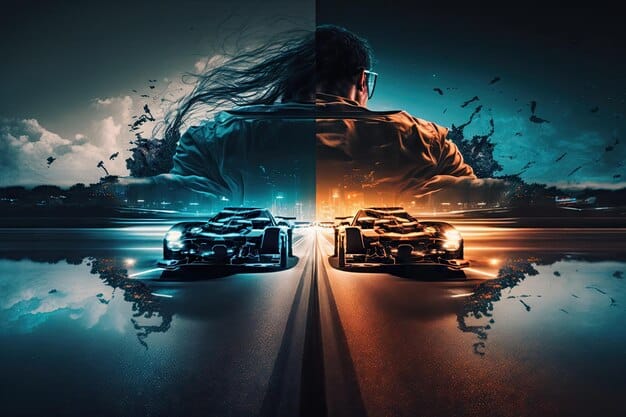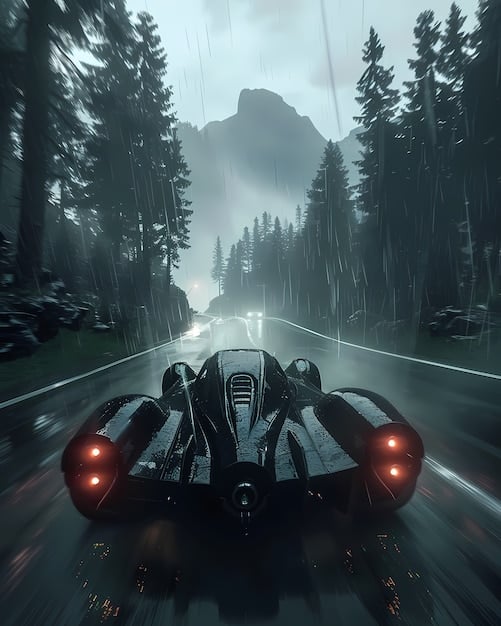The Impact of Video Games on Car Culture: Simulators & Real-World Inspiration

Video games, particularly racing simulators, have significantly influenced car culture by providing realistic driving experiences, inspiring vehicle customization, and fostering a passionate community for automotive enthusiasts.
The intersection of video games and car culture has grown increasingly significant over the years. From early arcade racers to sophisticated simulation games, the digital world has profoundly shaped how we perceive, customize, and interact with cars. This article explores the impact of video games on car culture: from simulators to real-world inspiration.
The Evolution of Racing Games and Car Culture
Racing games have evolved from simple arcade experiences to complex simulations that mimic real-world driving. This evolution has mirrored and, in some cases, influenced car culture itself. Let’s delve into how racing games have shaped our perception of cars and driving.
Early Racing Games: Planting the Seed
Games like “Pole Position” and “Out Run” introduced the thrill of racing to a wide audience. While not realistic, they captured the excitement and competitive spirit of motorsports.
The Rise of Simulation: Gran Turismo and Forza
Titles like “Gran Turismo” and “Forza Motorsport” set new standards for realism. These games meticulously recreated cars, tracks, and driving physics. They allowed players to experience driving in a way that was previously inaccessible.

These games weren’t just about racing; they were about collecting, customizing, and understanding cars. Players learned about different makes and models, performance metrics, and the impact of modifications.
- The level of detail in car models and tracks.
- The accurate representation of vehicle physics.
- The ability to fine-tune car setups for optimal performance.
- The social aspect of sharing tunes and racing against others online.
The evolution of racing games has not only entertained millions but has also educated and inspired a new generation of car enthusiasts. These games have played a pivotal role in shaping modern car culture by providing a virtual playground for automotive passion.
The Influence of Virtual Customization on Real-World Builds
One of the most significant impacts of video games on car culture is the ability to virtually customize vehicles. This digital sandbox has led to creative and innovative real-world builds. Let’s examine how virtual customization has translated into tangible car modifications.
Games like “Need for Speed” and “Midnight Club” offered extensive customization options. Players could modify everything from paint jobs and body kits to engine parts and suspension settings.
Experimentation Without Consequences
Virtual customization allows enthusiasts to experiment with different looks and performance upgrades without the financial risks of real-world modifications. This has led to a greater willingness to try new and unconventional designs.
Many car enthusiasts use video games as a virtual testbed for their real-world projects. They can visualize how different modifications will look and perform before committing to them.

- The impact of virtual customization on real-world trends.
- The ability to visualize modifications before making them.
- The inspiration drawn from game designs for real-life builds.
- The role of games in popularizing specific customization styles.
Virtual customization has democratized the car modification scene, allowing more people to participate and express their creativity. It has blurred the line between the virtual and real worlds, resulting in some truly innovative and eye-catching car builds.
The Rise of Esports and Sim Racing: A New Form of Motorsport
Esports and sim racing have emerged as a legitimate form of motorsport, attracting professional drivers, sponsors, and a large audience. This phenomenon has further solidified the connection between video games and car culture. Let’s explore the rise of esports and sim racing and its impact on the automotive world.
Sim racing platforms like iRacing and Assetto Corsa Competizione offer highly realistic simulations that closely mimic real-world racing. These platforms have attracted professional drivers who use them for training and competition.
Professional Drivers Embracing Sim Racing
Many professional drivers, including Formula 1 and NASCAR stars, participate in sim racing events. They recognize the value of sim racing as a tool for practicing racecraft and staying sharp between races.
The skills and techniques developed in sim racing can translate to real-world driving. Sim racers can improve their reaction times, car control, and strategic thinking.
- The realism and accuracy of modern sim racing platforms.
- The participation of professional drivers in sim racing events.
- The growing popularity of sim racing among car enthusiasts.
- The potential for sim racing to become a mainstream motorsport.
Esports and sim racing have opened up new opportunities for aspiring racers and enthusiasts. They have created a virtual proving ground where anyone can compete and potentially earn a spot in real-world motorsport.
Driving Simulators and Driver Training
Beyond gaming, driving simulators are increasingly used for driver training, offering a safe and controlled environment to develop skills. This practical application highlights the profound impact of simulation technology on car culture. Let’s consider how driving simulators are improving driver education and safety.
Improving Driver Safety and Skills
Driving simulators allow trainees to experience a wide range of driving scenarios, including adverse weather conditions, emergency situations, and distracted driving. This helps them develop the skills and confidence to handle real-world challenges.
Simulators can provide immediate feedback on driving performance, allowing trainees to identify and correct mistakes. This leads to faster and more effective learning.
- The use of simulators in driver education programs.
- The ability to simulate dangerous driving scenarios.
- The effectiveness of simulators in improving driver skills.
- The potential for simulators to reduce accidents and fatalities.
Driving simulators are becoming an essential tool for driver training, offering a cost-effective and safe way to improve driver skills and promote road safety.
Video Games as a Source of Car Design Inspiration
Automotive designers are increasingly drawing inspiration from video games. The futuristic car designs and innovative styling cues found in games are influencing the next generation of vehicles. Let’s explore how video games are shaping the future of car design.
Futuristic Concepts and Styling Cues
Games often feature concept cars and futuristic designs that push the boundaries of automotive engineering and styling. These designs can inspire real-world designers to think outside the box.
Automotive designers are using video games as a source of inspiration for new features and technologies. They are looking to games to understand what consumers want and expect from their vehicles.
- The influence of video game designs on real-world concept cars.
- The use of games as a source of inspiration for new automotive technologies.
- The potential for games to predict future car design trends.
- The blurring lines between virtual and real-world automotive design.
Video games are not just a form of entertainment; they are also a source of inspiration for automotive designers, helping to shape the future of car design.
Community Building and Shared Passion
Video games have fostered vibrant communities of car enthusiasts. Online forums, social media groups, and in-game clubs provide platforms for sharing passion, knowledge, and experiences. Let’s examine how video games have facilitated community building within car culture.
Forums, Social Media, and In-Game Clubs
Online forums and social media groups dedicated to racing games and car culture have become hubs for enthusiasts to connect, share tips, and organize events. In-game clubs provide a similar sense of community within the virtual world.
These communities offer a supportive environment for enthusiasts to learn, share their passion, and make friends. They also provide opportunities for collaboration and competition.
- The role of online forums and social media in connecting car enthusiasts.
- The sense of community fostered by racing games.
- The opportunities for collaboration and competition within these communities.
- The impact of video games on real-world car culture events.
Video games have created a global community of car enthusiasts, bringing people together from all walks of life to share their passion for cars and driving.
The Future of Video Games and Car Culture
The relationship between video games and car culture will continue to evolve. Advancements in technology, such as virtual reality and augmented reality, will create even more immersive and realistic experiences. Let’s speculate on the future of video games and car culture.
Virtual reality (VR) technology has the potential to revolutionize racing games and driving simulators. VR headsets can provide a fully immersive driving experience, allowing players to feel like they are actually behind the wheel.
Augmented Reality (AR) Integration
Augmented reality (AR) technology could be used to overlay virtual information onto real-world driving experiences. This could provide drivers with real-time feedback on their performance and help them improve their skills.
- The potential of VR and AR to enhance the realism of racing games.
- The impact of these technologies on driver training and safety.
- The possibilities for new forms of entertainment and competition.
- The continued blurring of lines between the virtual and real worlds.
As technology continues to advance, video games will play an even greater role in shaping car culture. They will continue to inspire, educate, and connect car enthusiasts around the world.
| Key Point | Brief Description |
|---|---|
| 🎮 Gaming Evolution | From simple arcade games to realistic racing simulators. |
| 🎨 Virtual Customization | Experimenting with modifications without real-world risks. |
| 🏆 Sim Racing | Esports transforming into legitimate motorsport. |
| 🤝 Community Impact | Building global communities of car enthusiasts. |
Frequently Asked Questions
Racing games often feature futuristic car designs and styling cues, inspiring real-world automotive designers to think outside the box and explore new possibilities in vehicle aesthetics and functionality.
Virtual customization in games allows enthusiasts to experiment with various modifications without financial risks. This helps them visualize and test different looks before committing to real-world car modifications.
Modern sim racing platforms are highly accurate, closely mimicking real-world racing conditions. Professional drivers even use them for training, recognizing their realism and value in honing driving skills.
Yes, driving simulators enhance safety by allowing trainees to experience dangerous scenarios in a controlled setting. This builds skills and confidence, reducing accidents by preparing drivers for real-world challenges.
Video games foster car culture communities by providing platforms for enthusiasts to connect, share knowledge, and organize events. Online forums and in-game clubs create supportive environments for collaboration and camaraderie among fans.
Conclusion
In conclusion, the intersection of video games and car culture has had a profound impact, shaping everything from car design and customization to driver training and community building. As technology advances, the virtual and real worlds will continue to merge, creating exciting new possibilities for car enthusiasts and the automotive industry alike.





